Join 40,000+ sales and marketing pros who receive our weekly newsletter.
Get the most relevant, actionable digital sales and marketing insights you need to make smarter decisions faster... all in under five minutes.
We heard it all the time. Businesses come to IMPACT, driven by word-of-mouth, compelled by our library of case studies. They’re here, but they’re skeptical. We’re asking for a total top-to-bottom commitment. We’re asking them to make a sizable investment in their future.
And honestly, I love their skepticism.
These are business owners who are proud of the companies they’ve built.
They’ve been prudent and diligent with their capital, and they want to do their homework before they invest it. And I respect that.
They always say the same thing: “Zach, we tried content marketing, but it didn’t really work for us.”
Here’s what I say back.
First off, let’s get to the heart of the challenge
Content marketing is not new. The ideas have been around for decades. At this point, no business professional is unfamiliar with a blog, search engine traffic, or social media.
The problem, it seems to me, is that too many people have misunderstood the true purpose of content marketing — and so have missed the mark on their past efforts.
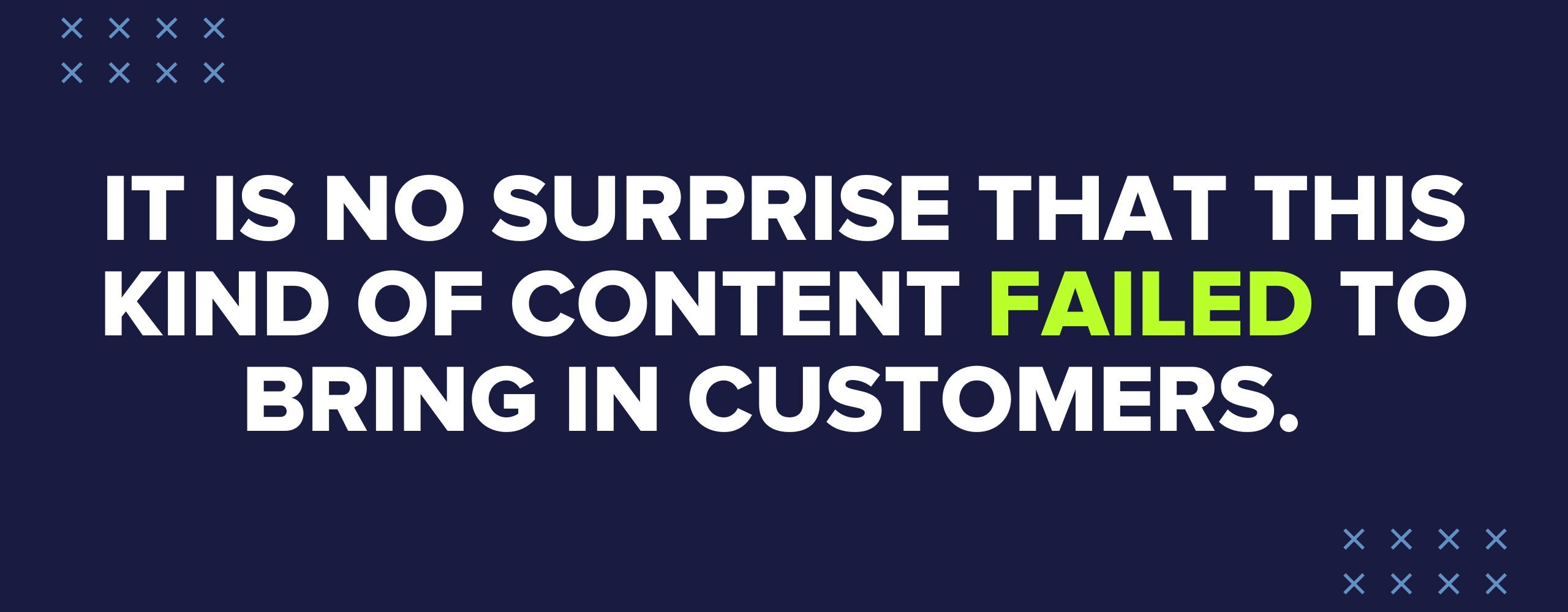
Go to most companies’ blogs and you’ll find fluffy, self-serving content: Pictures from their clean-up day at the local park, press release-style articles about promotions and employee of the month winners.
Or, it’s filled with content that feels derivative and identical to a thousand other articles on the internet.
It is no surprise to me that this kind of content failed to bring in customers.
Unremarkable effort, unremarkable results
With most things in life, your results match your efforts. As the saying goes, “you get out of it what you put into it.”
Same thing here.
When companies tell me about their forays into content marketing in the past, I’m not surprised it didn’t work for them.
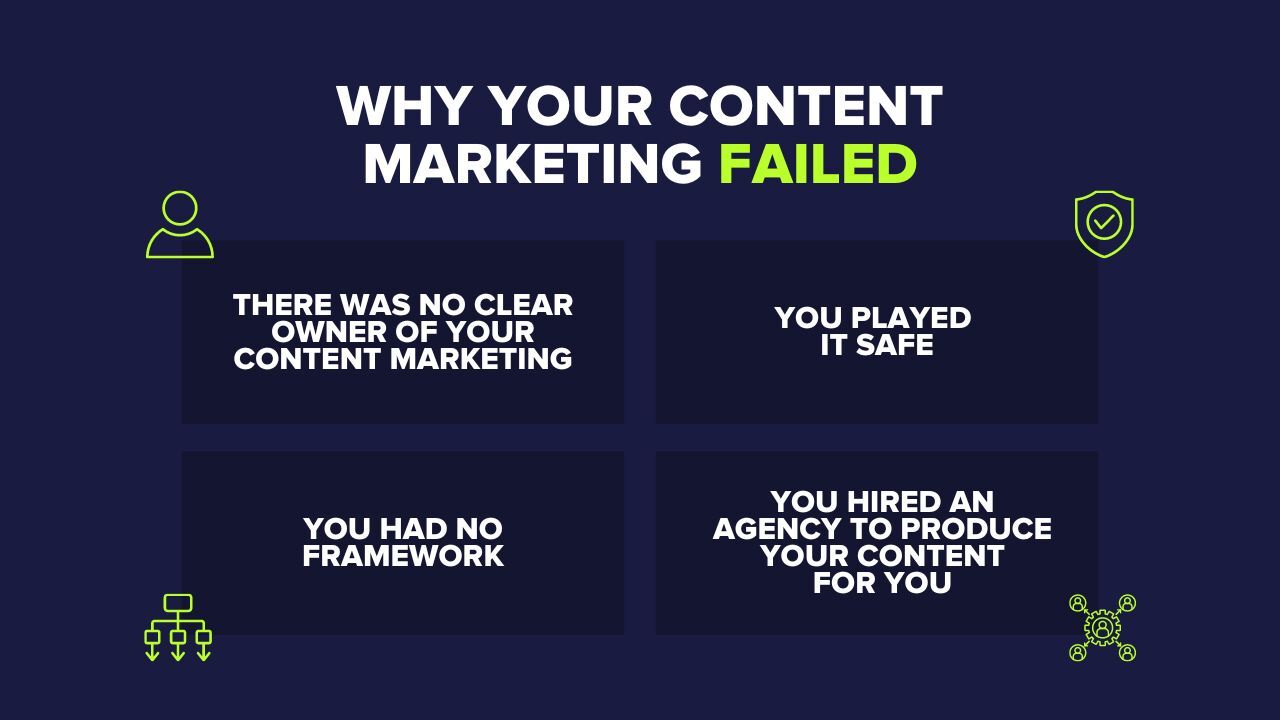
‘We tried content marketing…’
If you’re one of those businesses that “tried” content marketing, only to see sub-par results — I’ll bet you got out of it what you put into it.
This happens for a few all too common reasons, and I’ve seen dozens of companies fail because of these same few mistakes.
- There was no clear owner of your content marketing. If content marketing is something that gets tacked on to other responsibilities, it’s going to fall by the wayside. You can’t ask someone who already has a full-time job to also produce and implement a full content marketing strategy.
That in itself is a full-time job. Heck, it might be more than a full-time job. - You played it safe. To me, content marketing is about educating your customer. It’s about building trust and being transparent so that your potential buyers can access the information they need to become customers.
This means you need to address thorny subjects.
This means you have to offer honesty instead of a sales pitch.
When we tell businesses they need to tell their buyers the specific drawbacks and shortcomings of their products, some blink and decide to play it safe, undercutting the whole effort. -
You had no framework. If you don’t have a plan, you’re not going to get very far. A framework gives you structure and benchmarks. Without it, you’ve got guesswork and inconsistency.
-
You hired an agency to produce your content for you. The reason I’ve seen most content marketing initiatives fail is that businesses hire agencies to do it for them. This sounds like a good idea at first, but the results are almost always underwhelming.
The agencies produce the same bland, derivative content that sounds like everyone else in your industry — but it doesn’t sound like you. The content the agency produces just doesn’t resonate with buyers, and business leaders are left scratching their heads and wondering how they paid so much and got so little.
‘... but it didn’t work for us.’
There’s something to unpack here, too. What do you mean it didn’t work for you? How did you plan on measuring success?
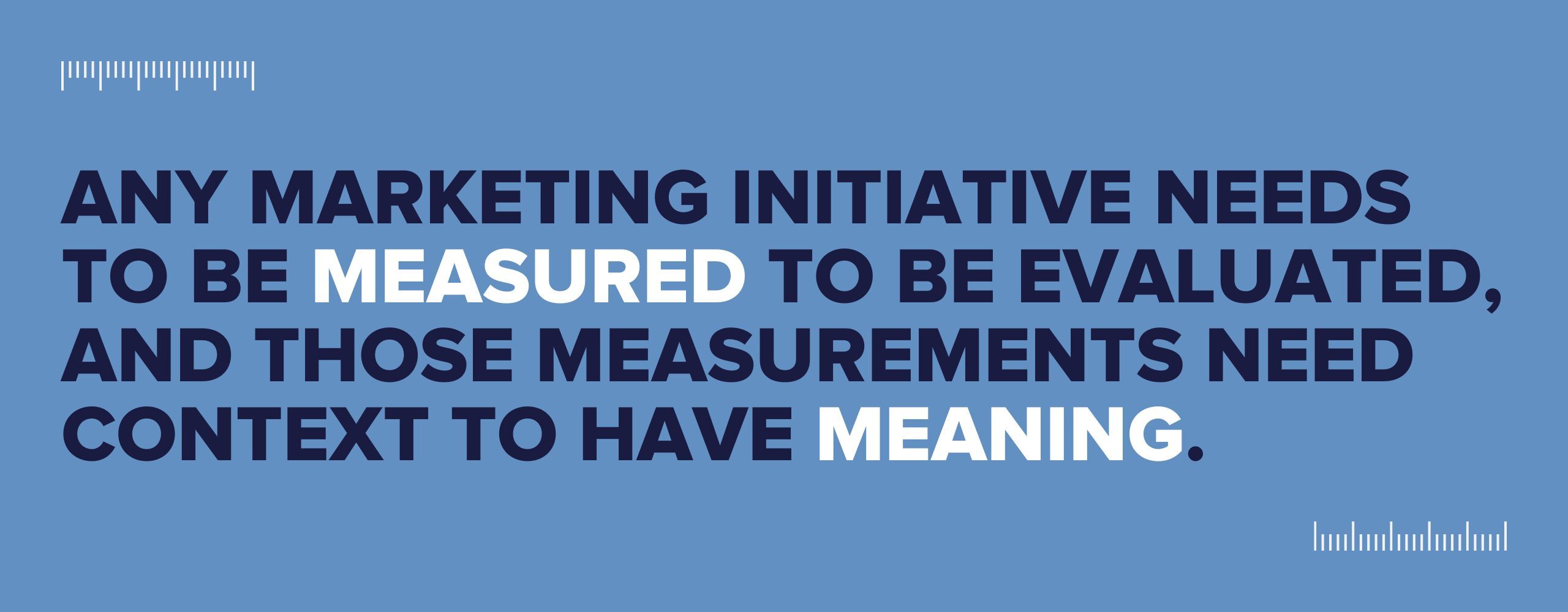
Any marketing initiative needs to be measured to be evaluated, and those measurements need context to have meaning.
At IMPACT, we find ourselves helping our clients unlearn what they thought they knew about content marketing.
Mistake No. 1: Thinking it’s all about traffic
The inbound funnel is a compelling idea: If you get enough traffic to your site, a percentage of that traffic will turn into leads, and a percentage of those leads will turn into sales.
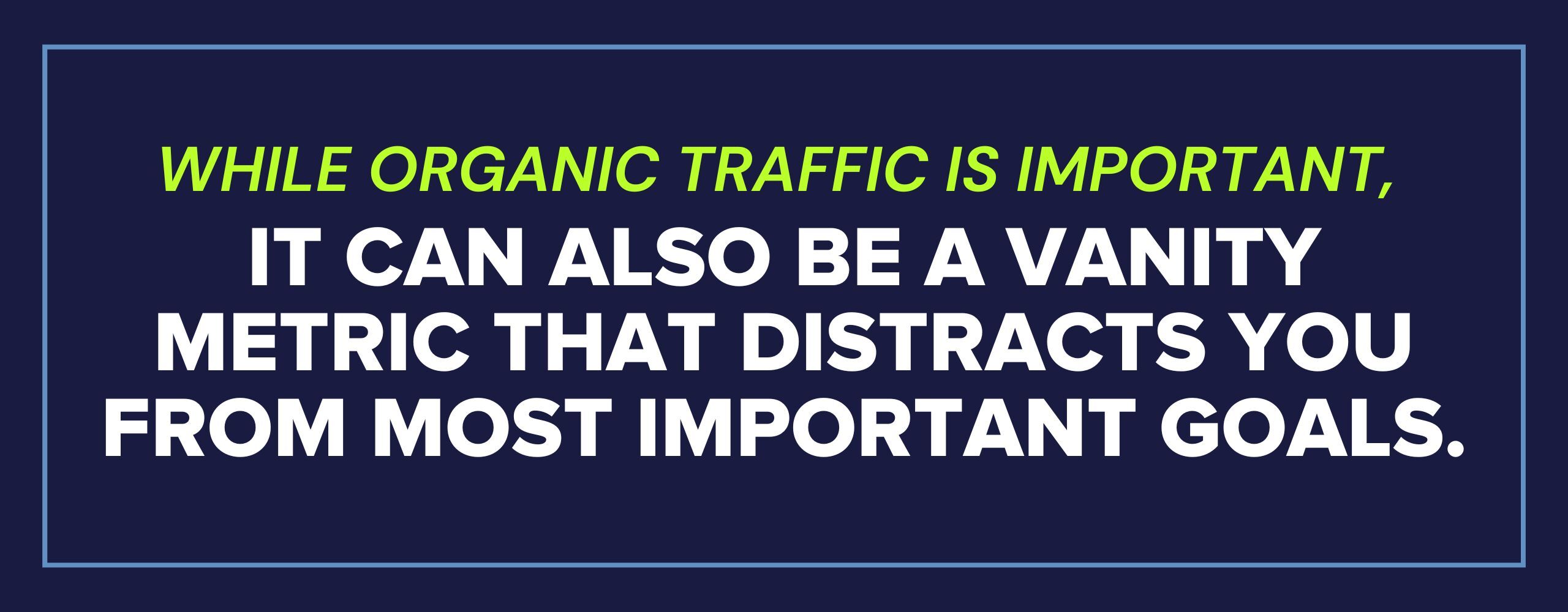
So people assume more traffic will equal more sales.
Not necessarily. While organic traffic is important, it can also be a vanity metric that distracts you from the most important goals.
Imagine this:
- Article A gets 10,000 views each month and brings in 10 customers.
- Article B gets 2,000 views each month and brings in 20 customers.
- Article C gets 500 views per month and brings in 50 customers.
Too often, companies chase Article A, putting their effort into high-trafficked content that doesn’t end up converting visitors into customers.
Which leads us to our second mistake.
Mistake No. 2: Not getting sales involved
At IMPACT, we teach a framework called They Ask, You Answer. While most people recognize it as an approach to content marketing, we’re quick to correct them. It’s actually more about sales. 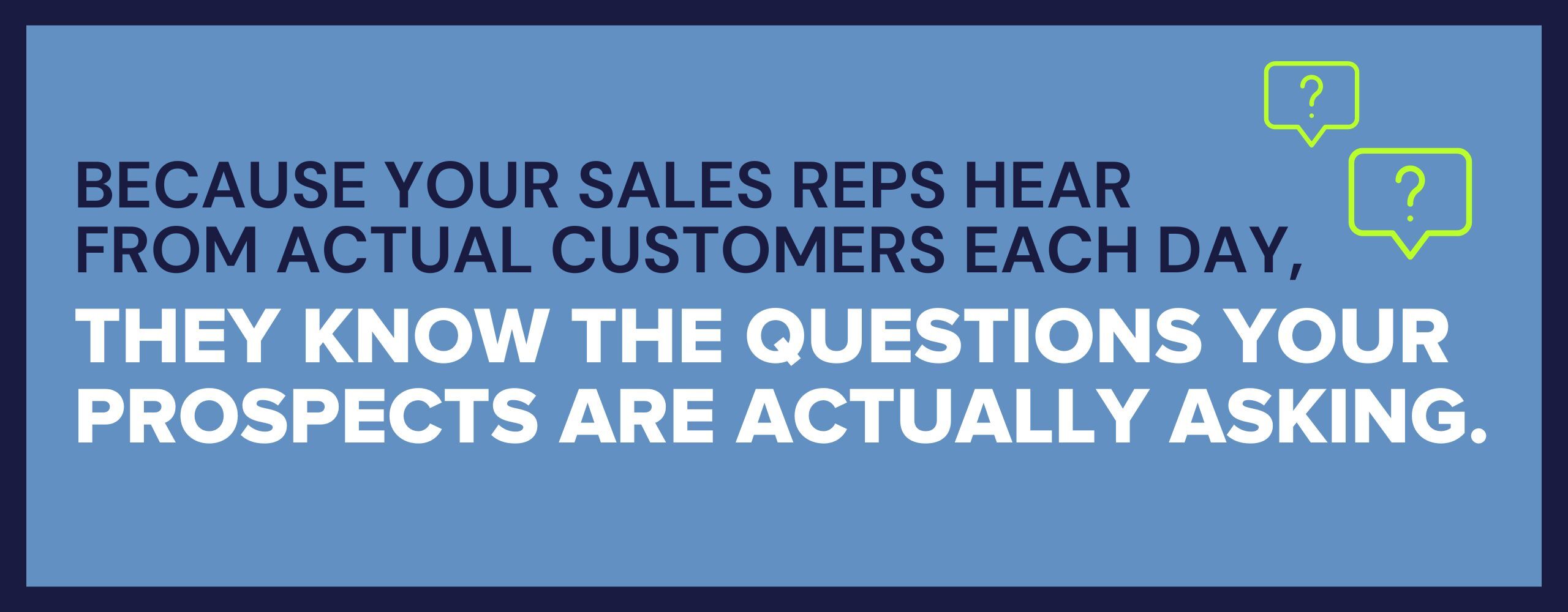
You see, if you don’t get your sales team involved with your content marketing, you are more likely to produce a library of Article A-type content. Marketers love to brag about reach, and what’s more encouraging than thousands of site visitors?
The sales team will bring your marketing team back down to earth. Because your sales reps hear from actual customers each day, they know the questions your prospects are actually asking. They know why Article C is the better investment of your team’s time.
The promise of content marketing
Look, I understand that companies get started in content marketing for a variety of reasons. But in most cases, the goal is to drive revenue. Brand recognition is great, but for most of the businesses I work with, it only matters if it translates into sales at the other end of the funnel.
When I hear business leaders tell me that content marketing didn’t work for them, it’s often due to the fact that they were chasing the metrics of brand recognition (organic traffic, social media engagement, etc.) — and they were likely working with an agency or putting in inconsistent effort themselves.
It’s no surprise the results didn’t materialize.
In order to end the epidemic of half-hearted content marketing, we need to reacquaint ourselves with the real objectives that matter, train our employees for excellence — and be ready for a long-term commitment.
Anything less will yield sub-par results.
If you're ready to learn more, join us for our free monthly consulting sessions where we address your most pressing marketing and sales challenges.


Register for IMPACT Live in Hartford CT, October 14-16!

